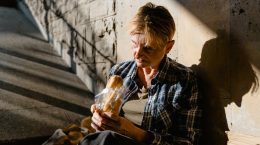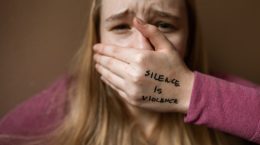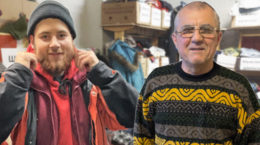Discrimination against women in Belarus persists even in the progressive XXI century. For example, the salary of Belarusian women is less, the list of permitted professions is already almost two hundred positions. And the Belarusian state openly declares that ladies have no place in the presidential chair – although the experience of Lithuania, Slovakia, Estonia, Moldova, Georgia shows the opposite. “Our House” has repeatedly raised issues of inequality between men and women in our country. We have devoted our review to our work against the infringement of Belarusians.
The topic of women’s rights in Belarus has been one of the main activities of “Our House” since the foundation of the organization. We have repeatedly touched upon the problem of women leaders, issues of gender imbalance, attended events dedicated to the inequality of men and women. So, on June 15, 2013, a meeting was held in Vitebsk with gender experts and authors of the resource package “Gender Educational Program”. The discussion touched upon the discrimination against women, the equality of people with a different sexual orientation. There is a significant influence of Russian channels, on which talking about traditional values often means intolerance to other people and other faiths. An activist of “Our House” visited the meeting.
In 2015, “Our House” raised the topic of women’s leadership in the public sphere in Belarus. We started talking about a female presidential candidate. Fierce disputes on this topic appeared in all media in the last years from 2013 to 2015. In the course of their activities, our activists have made several conclusions. For example, after analyzing the situation, we realized that a female politician in Belarus did not exist in the public sphere, no matter what she did. Another conclusion is that to form the image of a woman in the public sphere, provocations that cause emotions are needed. The traumatic experience of previous generations has led to the fact that Belarusians think that a successful woman has a husband and children who does not work but stays at home. The reason was the Second World War, which led to an acute shortage of men. Several generations of women had to be content that even a drinking male abuser at home is good because at least there is one. Thanks to its active position in the struggle for women’s rights, “Our House” has received a platform for voicing its thoughts on the economic reform of Belarus.
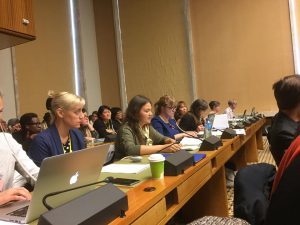 In 2016, Olga Karach spoke at the 65th session of the UN Committee on the Elimination of Discrimination against Women. In her speech, Olga told about “public” violence against activists: “It is used by such representatives of state structures like the police, officials, civil servants and other persons in power. Violence can change forms from physical to psychological. All these actions are aimed at subjugating, disciplining or punishing women.” Olga Karach identified four forms of police or state violence: beatings and sexual violence (or threats of violence), forced deprivation of parental rights for political activism, illegal forced placement in psychiatric hospitals, and driving to suicide. She also noted the gender pay gap: “According to national statistics, women receive an average of 76.2% of men’s wages. In areas where women predominate (education, health care, services), the gap is about 16%. In those areas that are “controlled” by men (construction, manufacturing, mining), the gap can reach 30%.”
In 2016, Olga Karach spoke at the 65th session of the UN Committee on the Elimination of Discrimination against Women. In her speech, Olga told about “public” violence against activists: “It is used by such representatives of state structures like the police, officials, civil servants and other persons in power. Violence can change forms from physical to psychological. All these actions are aimed at subjugating, disciplining or punishing women.” Olga Karach identified four forms of police or state violence: beatings and sexual violence (or threats of violence), forced deprivation of parental rights for political activism, illegal forced placement in psychiatric hospitals, and driving to suicide. She also noted the gender pay gap: “According to national statistics, women receive an average of 76.2% of men’s wages. In areas where women predominate (education, health care, services), the gap is about 16%. In those areas that are “controlled” by men (construction, manufacturing, mining), the gap can reach 30%.”
Activists constantly raise the topic of inequality between men and women in Belarus at international conferences, dialogues with international organizations. Thanks to the ICCI “Our House”, foreign politicians and public figures learned about gender inequality in our country. In 2017, “Our House” submitted a report on women’s rights to the UN Committee on the Elimination of Discrimination against Women. As a result of the work, our organization continued monitoring women’s rights in Belarus. We paid specific attention to the problem of public and state violence against socially and politically active women. “We are interested in eliminating gender inequality and social deprivation based on gender in the public space. To do this, we: 1) we improve and strengthen the position of active women in all spheres of public and political life in Belarus; 2) we help, support and protect women in extreme situations that have become a consequence of their social activity. Paying attention to violations of women’s rights, we intend to promote social solidarity in general and women’s solidarity in particular, accountability of the authorities and gender awareness among citizens,” the monitoring noted.
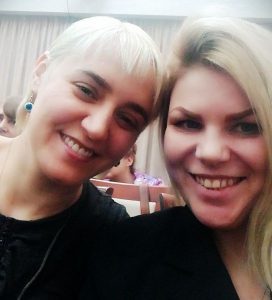 On November 16, 2017, representatives of “Our House” Olga Karach and Yulia Goryachko attended the International Gender Conference “Women and Elections”. It was also attended by foreign guests: a member of the Lithuanian Seimas, ex-Minister of Defense, Vice-President of the NATO PA Rasa Jukniavichene, member of the Rigsdag, member of the Liberal Party of Sweden Birgitta Olsson, member of the Riksdag, member of the Social Democratic Party of Sweden Sultan Kayhan, deputy of the local council from the party “Power of People” Irina Slavova. During the event, presentations of Women’s Leadership Clubs, the “Women against Fraud” campaign, the “Right to Choose” monitoring campaign passed.
On November 16, 2017, representatives of “Our House” Olga Karach and Yulia Goryachko attended the International Gender Conference “Women and Elections”. It was also attended by foreign guests: a member of the Lithuanian Seimas, ex-Minister of Defense, Vice-President of the NATO PA Rasa Jukniavichene, member of the Rigsdag, member of the Liberal Party of Sweden Birgitta Olsson, member of the Riksdag, member of the Social Democratic Party of Sweden Sultan Kayhan, deputy of the local council from the party “Power of People” Irina Slavova. During the event, presentations of Women’s Leadership Clubs, the “Women against Fraud” campaign, the “Right to Choose” monitoring campaign passed.
In December 2017, “Our House”, the International Center for Gender Initiatives “Adliga: Women for Full Citizenship”, and the German human rights organization BSV held a round table. At it, Olga Karach raised the topic of the persecution of active women by the state: “The women we work with are very different. But everyone has one thing in common – disobedience. The state strangely perceives the word ” no ” from a woman. It is enough to express your disagreement, and the conflict begins. There is a response to break, to force to accept.” Olga Karach also noted that women turn to “Our House” at the stage when it is difficult to resolve the struggle peacefully. That is why a network of women mediators who help in conflicts has appeared in the ICCI “Our House”. In February 2018, we presented and discussed our work results in the European Parliament.
In 2018, the Center for the Promotion of Women’s Rights “Her Rights” organized a discussion in which representatives of “Our House” also actively participated. Our activists told about the jobs prohibited for women, focused attention on the fact that sometimes hard work is also found in typically female professions – for example, cooks, where the vast majority of ladies. In addition, activists raised the issue of violation of gender equality in maternity leave for infant care. The mother’s vacation is provided without problems. But the father needs many documents and certificates to go on paid leave to care for a born child.
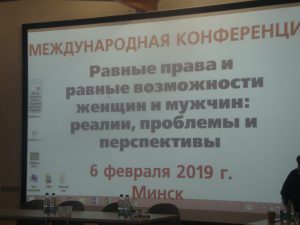 In 2019, the ICCI “Our House” took part in the international conference of public organizations and parties called “In-depth Dialogue”. The speech at the event was about gender inequality. In the article on the conference results, the human rights defender of the ICCI “Our House” Valery Shchukin noted that discrimination against women in Belarus is laid down in the Constitution. For example, article 32 of the Basic Law stipulates: “Women are provided with equal opportunities with men”. Thus, the existence of inequality for ladies is already initially recognized.
In 2019, the ICCI “Our House” took part in the international conference of public organizations and parties called “In-depth Dialogue”. The speech at the event was about gender inequality. In the article on the conference results, the human rights defender of the ICCI “Our House” Valery Shchukin noted that discrimination against women in Belarus is laid down in the Constitution. For example, article 32 of the Basic Law stipulates: “Women are provided with equal opportunities with men”. Thus, the existence of inequality for ladies is already initially recognized.
The problem of gender inequality has not gone away after the elections. On the contrary, it has become more noticeable – many repressions against women are motivated by gender. Therefore, we continue to fight for women’s rights. On September 30, 2020, Olga Karach became a participant in the webinar “Helping women and girls facing gender-based violence during the crisis: security and psychological stability of those who help women-challenges, pressures and strategies”. The discussion, organized by the British organization VOICE, discussed assisting women and girls issues in Russia, Ukraine, Kyrgyzstan and the United Kingdom. The participants talked about working with gender-based violence, the safety of helping teams and their psychological health during the global COVID-19 crisis.
 In March 2021, we relaunched the 252+1 campaign dedicated to the specializations prohibited for women in Belarus. The history of the campaign began in 2013 – we have prepared 252 illustrations of professions in which Belarusians cannot work. Olga Karach told about this in an interview with DW. “The existence of such a list is absurd in itself because no one except the woman herself has the right to determine her fate. Its preservation means the authorities use the ideas of the past centuries about the state of technology and industrial production. Finally, there are many highly paid professions on this list. That is, the state also deprives women of the opportunity to earn well. We are launching a series of videos on social networks dedicated to women’s rights restrictions and the ban on professions. We are also preparing an online petition demanding that the government of Belarus cancel the “black list” if we build a democratic state based on the rule of law without discrimination based on gender.”
In March 2021, we relaunched the 252+1 campaign dedicated to the specializations prohibited for women in Belarus. The history of the campaign began in 2013 – we have prepared 252 illustrations of professions in which Belarusians cannot work. Olga Karach told about this in an interview with DW. “The existence of such a list is absurd in itself because no one except the woman herself has the right to determine her fate. Its preservation means the authorities use the ideas of the past centuries about the state of technology and industrial production. Finally, there are many highly paid professions on this list. That is, the state also deprives women of the opportunity to earn well. We are launching a series of videos on social networks dedicated to women’s rights restrictions and the ban on professions. We are also preparing an online petition demanding that the government of Belarus cancel the “black list” if we build a democratic state based on the rule of law without discrimination based on gender.”
After the elections, we decided to return to this campaign. Over the past years, the number of professions prohibited to women has decreased, and similar lists have disappeared in neighbouring countries. We wrote about the main changes in the list and clarified that there are still works where there is no place for Belarusians. We also noted that the Belarusian Ministry of Labour and Social Protection has thought about cancelling the list – but in the National Plan for Gender Equality for 2021-2025, we are talking only about reducing it. Meanwhile, the list prevents the equalization of salaries of men and women. Their difference in Belarus reaches 30 per cent in favour of men. And the cherished “+1 ” says that the patriarchal, illegitimate state still believes that there is no place for a woman in the government of Belarus. In another article, we told that some specialities are not available to Belarusians in universities. Even if they get an education, they may not be able to get a job by profession.
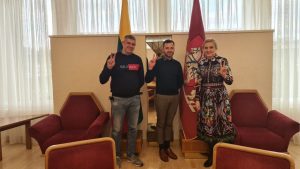 On April 16, 2021, Olga Karach met with Tomas Vytautas Raskevicius, the Lithuanian Parliamentary Committee on Human Rights head. She spoke about gender-motivated repressions against women in Belarus. It is an economic force, punishment in the form of unaffordable fines. These are threats to take away children and pressure on family members. It is the placement of bloggers, journalists, human rights defenders in specific psychiatric institutions. We must note that such repressions are not applied against men.
On April 16, 2021, Olga Karach met with Tomas Vytautas Raskevicius, the Lithuanian Parliamentary Committee on Human Rights head. She spoke about gender-motivated repressions against women in Belarus. It is an economic force, punishment in the form of unaffordable fines. These are threats to take away children and pressure on family members. It is the placement of bloggers, journalists, human rights defenders in specific psychiatric institutions. We must note that such repressions are not applied against men.
The usurping government is very reluctant to make changes in the life of Belarusian women. Even though some previously prohibited specialities opened to girls, their life has not become trouble-free. Gender-motivated repression continues in the country, which affects not only women but also their children. Girls have to work in abnormal conditions for a lower salary, suffer harassment from male bosses. It is easier to put pressure on them and force them to vote for the right candidate in the elections – because they are thinking about family and children. All this infringes on women rights – and we want that there would be no such attitude to children in Belarus without Lukashenka.


